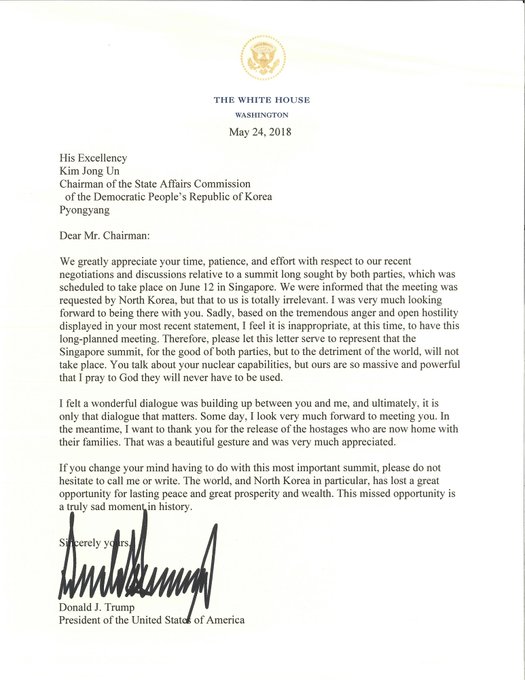Just hours after North Korea destroyed its nuclear test site, Donald Trump announced he is canceling his summit with Kim Jong-un which was scheduled to take place in Singapore on June 12.
In a letter to the North Korean leader, Trump said he felt it was "inappropriate, at this time, to have this long-planned meeting" after "tremendous anger and open hostility" displayed in Pyongyang's most recent statement. He also warned North Korea that the US military �which is by far the most powerful anywhere in the world�is ready if necessary.�

The White House
?@WhiteHouse
The full letter from the President Trump to Chairman Kim Jong Un : http://45.wh.gov/sDF8YL
7:02 PM - May 24, 2018
Political commentator and journalist�John Wight�told RT that Trump�s decision to pull out of the summit should not come as a surprise to anyone who has been following the trajectory of US administration��with any degree of awareness.�
�After all we�ve had a pattern of sanctions and threats: sanctions and threats leveled against Iran recently, sanctions and threats against Russia� China�Venezuela and� sanctions, threats and air strikes against Syria,��he explained.
In his view,��this is clearly an administration that believes that US hard power rather than international diplomacy or indeed international law should be the arbiter of international affairs.�
Wight added that he didn�t believe the Trump administration was serious about the Singapore summit from the very beginning.
Trump�s decision��shows the divisions within the US policy,��according to�Sreeram Chaulia, Professor & Dean of Jindal School of International Affairs.
�We have a lot of hawks in right-wingers led by people like John Bolton, Mike Pence�They didn�t want these talks to happen. They want regime change,��he told RT.
Asked what more do North Koreans need to do to get Trump to the table even after Pyongyang destroyed its nuclear test site, Chaulia pointed out that��it is a give and take: it has to be based on quid pro quo.�
He noted that the North Koreans have given confidence building measures:��they released those three American citizens, they have closed their nuclear test site. They have been also saying that they will keep a moratorium on missiles and nuclear tests.�
�But Trump was trying to get a unilateral one-sided victory without giving anything in return� If Americans really want stability on the Korean peninsula, they have to give some to get some,"�he added.
Former US diplomat�Jim Jatras�agrees that��it is pretty clear that most of the people around President Trump did not want the summit to take place.��In his view,��they were horrified at the thought that Trump would sit across the table eye-to-eye from Kim Jong-un and agree to something that they may not have approved of.�
Jatras also claimed that there is a lot of relief in Washington that the idea of summit has collapsed.��They want a Libyan solution to North Korea. When North Korea gives up its weapons but then is vulnerable to the regime change. And I think that is the underlined reality on the American side that led to the collapse of this talk,��he concluded.
Donald Trump called the cancellation of the US-North Korea Summit��a tremendous�setback�for North Korea and indeed a setback for the world.�
Charles Shoebridge, security analyst and former UK counter terrorism intelligence officer, said:��It may not be the end of it, but the blame for cancelling the meeting should surely go to the person who has actually cancelled it."
�Trump and the US are saying that the condition of, not the talks, but the success for talks is that North Korea should disarm in a nuclear sense. And it really does seem that is very unlikely to happen. And a reason for that is the record of the US behavior and its allies� behavior in the wake of other countries disarming,��Shoebridge cited Iraq and Libya as examples.
The US� unilateral pulling out from the Iran deal also sends a message, the analyst said.��Remember, Iran has actually complied with all of the requirements that were made of it in 2015 nuclear deal. It is America that reneged on this agreement. And that is sending a clear message��
He suspects that the US in the long term is doing��a great deal even more damage to its credibility as an honest broker anywhere in the world because it is simply doesn�t seem to be capable of sticking to the commitments or at least the spirit of the commitments that it is asking others to undertake.�










